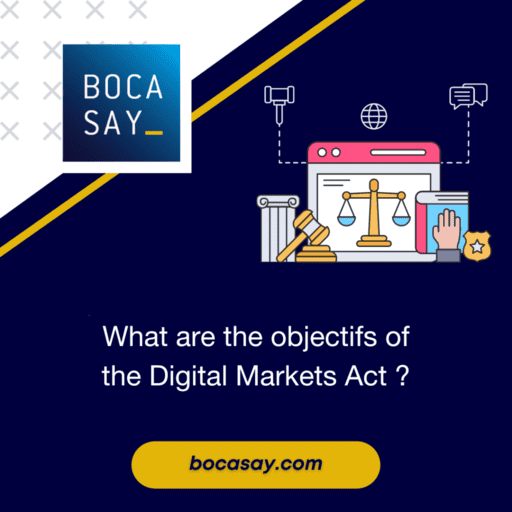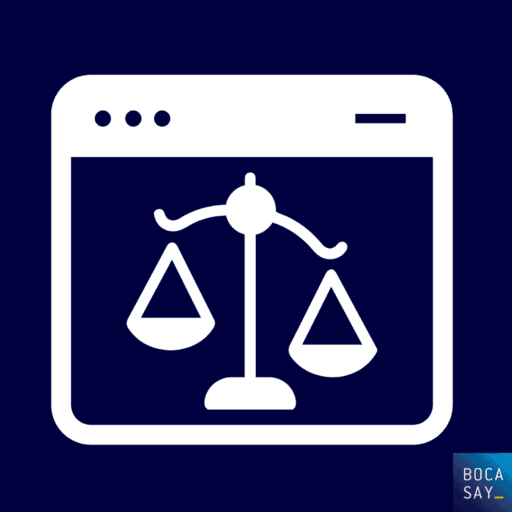What is the EU’s Digital Markets Act (DMA) all about?
Targeting the largest digital platforms operating within the EU, the Digital Markets Act is expected to lead to changes with a wider reach than the EU’s 400 million internet users. The main objective of the Digital Markets Act is to regulate digital monopolies established by big-tech and to essentially establish a fair competition environment.
By classifying certain digital platforms as ‘Gatekeepers’, based on their user numbers, market share and capitalization, the EU will impose new obligations on big-tech giants.
Significantly impacting data-sharing and app development, the DMA is a culmination of worldwide concerns regarding the economic power of digital tech giants like Google.
In this article, Bocasay, your offshore outsourcing company, provides an overview of the Digital Markets Act, helping your company to stay up-to-date with the latest developments of the global digital economy.

Timeline of the Digital Markets Act
Before understanding the future potential impact of the DMA, it is important to outline some of its key development stages:
Proposal 💬
The DMA regulation was first proposed by the European Commission in December of 2020.
Legislation 👩⚖️
The DMA was signed into law by the European Parliament and the EU council in September of 2022.
Application ✅
While the DMA has been in force since the 1st of November, 2022, it will only become applicable for the most part by May 2nd, 2022.
The Market Impact of the Digital Markets Act
The DMA covers 8 different market sectors, or core platform services, that the EU commission considers problematic because of the omnipresence and reach of colossal digital companies that essentially control all access to digital markets.
While the European Commission has not yet officially released a list of companies that it considers digital ‘gatekeepers’, the following market sectors, and associated examples, are expected to be significantly impacted by the DMA’s implementation:
- Online Search Engines (Google Search)
- Online Intermediation Services (Google Play, App Store and Amazon Marketplace)
- Social Networks (Facebook, Twitter, Tik-Tok)
- Video Sharing Platforms (YouTube)
- Communication Platforms (WhatsApp, Gmail and Signal)
- Operating Systems (Google Android and iOS)
- Cloud Services (Google Cloud Platform)
- Advertising Services (Google Ads)
ℍ𝕒𝕧𝕖 𝕪𝕠𝕦 𝕖𝕧𝕖𝕣 𝕦𝕤𝕖𝕕 𝕠𝕗𝕗𝕤𝕙𝕠𝕣𝕖 𝕠𝕦𝕥𝕤𝕠𝕦𝕣𝕔𝕚𝕟𝕘 𝕗𝕠𝕣 𝕪𝕠𝕦𝕣 𝕀𝕋 𝕤𝕪𝕤𝕥𝕖𝕞? 𝔻𝕚𝕕 𝕪𝕠𝕦 𝕜𝕟𝕠𝕨 𝕥𝕙𝕒𝕥 𝕠𝕦𝕥𝕤𝕠𝕦𝕣𝕔𝕚𝕟𝕘 𝕒𝕝𝕝𝕠𝕨𝕤 𝕪𝕠𝕦 𝕥𝕠 𝕖𝕩𝕡𝕝𝕠𝕚𝕥 𝕥𝕙𝕖 𝕗𝕦𝕝𝕝 𝕡𝕠𝕥𝕖𝕟𝕥𝕚𝕒𝕝 𝕠𝕗 𝕪𝕠𝕦𝕣 𝕔𝕠𝕞𝕡𝕒𝕟𝕪 𝕥𝕙𝕒𝕟𝕜𝕤 𝕥𝕠 𝕥𝕠𝕠𝕝𝕤 𝕕𝕖𝕧𝕖𝕝𝕠𝕡𝕖𝕕 𝕥𝕠 𝕞𝕖𝕒𝕤𝕦𝕣𝕖? ℂ𝕠𝕟𝕥𝕒𝕔𝕥 𝕥𝕙𝕖 𝕠𝕗𝕗𝕤𝕙𝕠𝕣𝕖 𝕠𝕦𝕥𝕤𝕠𝕦𝕣𝕔𝕚𝕟𝕘 𝕔𝕠𝕞𝕡𝕒𝕟𝕪 𝔹𝕠𝕔𝕒𝕤𝕒𝕪 𝕟𝕠𝕨, 𝕒𝕟𝕕 𝕘𝕖𝕥 𝕪𝕠𝕦𝕣 𝕗𝕣𝕖𝕖 𝕢𝕦𝕠𝕥𝕖!
Which Companies Could be Considered ‘Gatekeepers’?
According to both the EU council and parliament, a digital platform can be considered a market ‘gatekeeper’ based on the following criteria:
- An annual turnover of at least €7.5 billion within the European Union in the past 3 years, or a market valuation of at least €75 billion.
- At least 45 million monthly end-users combined with 10,000 business users established within the EU.
- A company that controls one or more core platform services in at least 3 European member states.
- Last but no least, SMEs are for the most part exempt from being identified as ‘gatekeepers’, apart from exceptional cases. ‘Emerging Gatekeeper’ is another category established to impose some obligations on companies with proven but not sustainable competitive advantages.
Key Changes Expected from the Digital Markets Act
Implementing the DMA in Europe is expected to establish a series of new obligations for companies that are eventually classified as ‘gatekeepers’, as well as to impose new rules on a range of forbidden actions that are aimed to protect consumers and promote healthy competition.
Self-Preferencing
Under DMA rules, companies that are ultimately classified as ‘gatekeepers’ will no longer be allowed to engage in self-preferencing. This refers to the practice of ranking their own products and services higher than those of their competitors.
This happens for example when someone searches for ‘cloud storage’ on Google, with Google’s Cloud Storage being the top result. Prohibiting self-preferencing by ‘gatekeepers’ can ensure a fairer playground for newcomers and start-ups.
Data Reusage
Once the DMA is implemented in Europe, ‘Gatekeeper’ companies are likely to be prohibited from re-using their users’ personal data collected from a service for the purposes of another service.
For example, companies like Facebook could be forbidden from using data collected from WhatsApp, one of its many subsidiary companies. This can also help prevent users from being signed-in to other services offered by the ‘gatekeepers’ without their consent.

Data Portability and Interoperability
Another aspect of the digital economy tackled by the DMA is how giant tech companies facilitate data portability and interoperability.
Ever wondered why you can only download apps from Apple’s app store if you have an iphone? Or why you cannot send a message from WhatsApp to a Signal user?
DMA implementation will likely force gatekeepers to ensure the interoperability of their messaging services’ basic functionalities, as well as to provide access to key business performance data for business users.
Business-User Protection
The DMA will force tech-giants to offer fairer conditions for their business users.
For example, the DMA could prohibit companies like Apple from imposing a 30% commission on all transactions taking place in its App store, enabling higher profits and flexibility for app developers. Another example that could soon be prohibited is Amazon requiring e-book publishers to apply their best conditions on the Amazon e-book marketplace.
Device-Neutrality
Based on device-neutrality law, users have a right of non-discrimination of the services and apps they use, according to platform control by hardware companies. The DMA could soon force tech-giants to provide their users with the right to delete pre-installed applications, like from Apple’s iOS or Google’s Android, as well as the right to install apps from alternative sources.
In addition, the DMA could allow app developers to access the supplementary functionalities of smartphones (for example NFC chip).
Bundling-Prohibition
Finally, the DMA aims to tackle some bundling practices in which gatekeepers essentially force their business users to use, offer or interoperate their own products and services.
For example, requiring app developers to use only certain payment systems or identity providers in order to be listed in app stores will most probably be prohibited after the eventual implementation of the DMA.